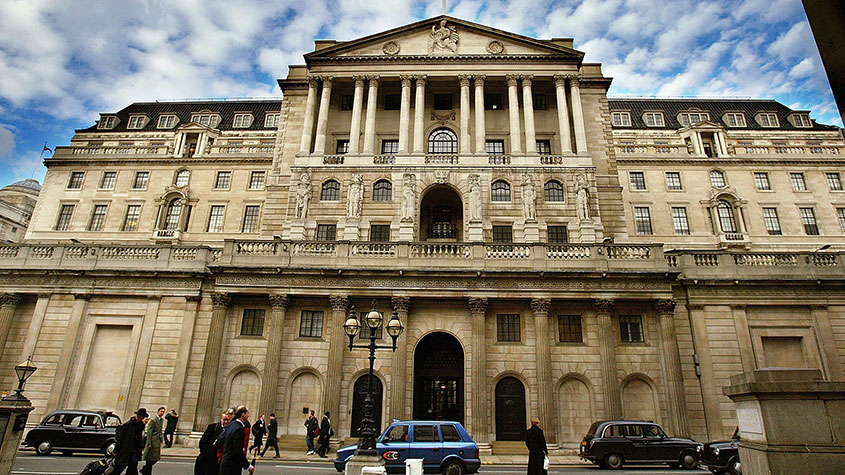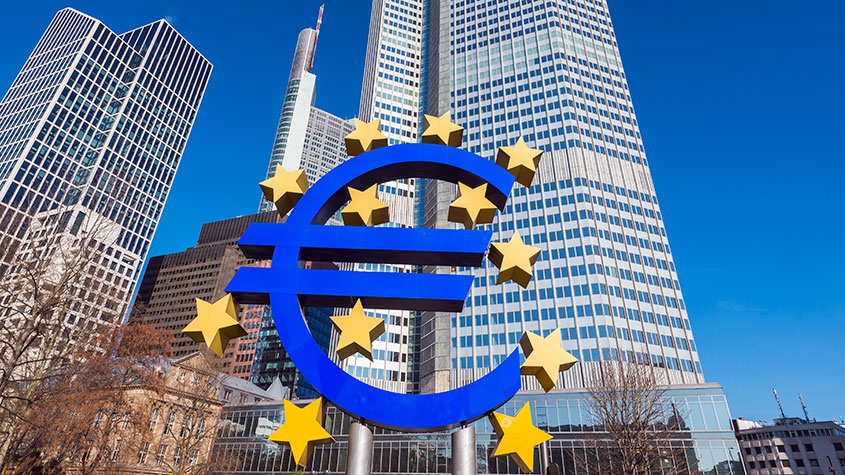The bond market keeps getting crazier – don’t get caught in the rout
Investors are clamouring to pay for the privilege of lending to the Swiss government. But as John Stepek explains, things could be about to get a whole lot crazier.

Get the latest financial news, insights and expert analysis from our award-winning MoneyWeek team, to help you understand what really matters when it comes to your finances.
You are now subscribed
Your newsletter sign-up was successful
Want to add more newsletters?

Twice daily
MoneyWeek
Get the latest financial news, insights and expert analysis from our award-winning MoneyWeek team, to help you understand what really matters when it comes to your finances.

Four times a week
Look After My Bills
Sign up to our free money-saving newsletter, filled with the latest news and expert advice to help you find the best tips and deals for managing your bills. Start saving today!

Last week, we saw another landmark hit in our topsy-turvy world of money printing.
On Wednesday, the Swiss government became the first government in the world (according to several reports, at least) to have investors clamouring to pay it for the privilege of lending it money over ten years.
The bonds which pay the lender back in July 2025 sold at a yield of -0.055%. So if you bought the bond on Wednesday, and you hold it until maturity, then you'll get back less than you loaned the Swiss in the first place.
MoneyWeek
Subscribe to MoneyWeek today and get your first six magazine issues absolutely FREE

Sign up to Money Morning
Don't miss the latest investment and personal finances news, market analysis, plus money-saving tips with our free twice-daily newsletter
Don't miss the latest investment and personal finances news, market analysis, plus money-saving tips with our free twice-daily newsletter
It sounds crazy.
It is crazy.
But while central banks keep churning out money, things could get a whole lot crazier.
Why would anyone want to buy a bond with a negative yield?
For a start, the Swiss economy is in deflation. In the year to March, Swiss prices fell by 0.9%. In other words, they're in the unusual situation where £100 today will actually be worth more in a year's time, rather than less. So if you're a Swiss saver, then you can still get a real' (after deflation) return on your money as long as your savings shrink at a slower rate than prices.
In the case of the ten-year bonds, a -0.055% yield doesn't look quite as bad if you realise that it's a positive real' return assuming deflation continues at current levels or gets worse.
Secondly, if deflation does get worse, other investors might be willing to accept an even more negative yield. So you could probably sell the ten-year bond in the secondary market for a higher price than you paid for it.
Thirdly, there's the reason behind the Swiss economy being in deflation. It's mainly because the Swiss have thrown in the towel in the currency wars. They gave up printing money to keep the Swiss franc down against the euro when they realised that the European Central Bank (ECB) was about to start printing.
It was a fight the Swiss couldn't hope to win. They were going to be flooded with money fleeing the euro, and it would have been costly for the Swiss central bank to try to counter that. As a result, the Swiss franc is now one of the world's stronger currencies. And that also increases demand from overseas investors for Swiss franc assets despite efforts to put them off.
So there you go three logical reasons to buy Swiss bonds on negative yields.
Of course there's a problem here. And that's the fact that these logical reasons are founded on us continuing to live in an utterly insane world.
This is all dependent on central banks continuing to print money
Even when Japan was mired in the worst of its deflation, its ten-year bonds never went negative. So this isn't about the economic backdrop it's about market mania.
Steven Major, a fixed income (that's another name for bonds) expert at HSBC, put it very well in the FT. "We have unconventional central bank policies at work so you have to expect unconventional outcomes. One is that bonds are no longer trading like bonds. They now trade like commodities with investors speculating on price."
Now if you've been a reader of Money Morning for a while, you might remember that we don't tend to think of commodities as a traditional investment. That's because they don't generate an income (or at least not in the way that a company or rental property does). So if you buy a commodity, you're betting that the price will go higher in the future. You're taking a punt, basically.
I see gold as different from other commodities it's a useful form of insurance against financial instability but this criticism is often directed at the yellow metal too. It doesn't pay an income. In fact, you have to pay to hold it.
But as Major notes, you can now say the same thing for bonds. You have to pay to hold them.
I've held up the Swiss as the key example here, but bonds with negative yields are everywhere. The FT describes them as "one of the world's fastest-growing asset classes". As Reuters notes, Swedish and Danish bonds are trading hands on negative yields "out to about five years".
How to invest in this topsy-turvy world
Secondly and this is rather more old-fashioned thinking I don't like the idea of investing in an over-valued sector just because it has momentum behind it.
So I'd favour equities over bonds. They're arguably not as overvalued. If you're an income seeker, you can still benefit from decent dividend yields. And shares in Europe and Japan in particular will also benefit from money printing. Yes, there's more risk to your capital, but the risk of capital loss on bonds (non-government ones certainly) has got to be growing too.
And hang on to some gold. If you're going to own an asset with a negative yield, it might as well be one that has absolutely no bankruptcy risk, even although its capital value may be volatile. If the bond market supercycle comes to a nasty end, gold is likely to benefit in the ensuing havoc.
You can learn more about the potential risks from government debt and deflation in my colleague Tim Price's latest take on Europe if you haven't read it already, you should take a look at it here.
Get the latest financial news, insights and expert analysis from our award-winning MoneyWeek team, to help you understand what really matters when it comes to your finances.

-
 How a ‘great view’ from your home can boost its value by 35%
How a ‘great view’ from your home can boost its value by 35%A house that comes with a picturesque backdrop could add tens of thousands of pounds to its asking price – but how does each region compare?
-
 What is a care fees annuity and how much does it cost?
What is a care fees annuity and how much does it cost?How we will be cared for in our later years – and how much we are willing to pay for it – are conversations best had as early as possible. One option to cover the cost is a care fees annuity. We look at the pros and cons.
-
 How have central banks evolved in the last century – and are they still fit for purpose?
How have central banks evolved in the last century – and are they still fit for purpose?The rise to power and dominance of the central banks has been a key theme in MoneyWeek in its 25 years. Has their rule been benign?
-
 Do we need central banks, or is it time to privatise money?
Do we need central banks, or is it time to privatise money?Analysis Free banking is one alternative to central banks, but would switching to a radical new system be worth the risk?
-
 The French economy's Macron bubble is bursting
The French economy's Macron bubble is burstingCheap debt and a luxury boom have flattered the French economy. That streak of luck is running out.
-
 The Bank of England can’t afford to hike interest rates again
The Bank of England can’t afford to hike interest rates againWith inflation falling, the cost of borrowing rising and the economy heading into an election year, the Bank of England can’t afford to increase interest rates again.
-
 Bank of England raises interest rate by 0.5%
Bank of England raises interest rate by 0.5%News The Bank of England has raised interest rates once again, this time by 0.5%. This takes the bank’s base rate to 3.5%, the highest it’s been since 2008.
-
 Eurozone inflation hits 10.7% in October
Eurozone inflation hits 10.7% in OctoberNews Inflation across the eurozone hit 10.7% in October. What does it mean for your money?
-
 A forgotten lesson on the dangers of energy price caps
A forgotten lesson on the dangers of energy price capsAnalysis Liz Truss’s proposed energy price cap is an ambitious gamble. But a similar programme in Spain ended up being a fiasco, say Max King and Tom Murley. Here, they explain why Truss’s plan could be doomed to failure.
-
 Central banks can’t solve our current economic problems
Central banks can’t solve our current economic problemsAnalysis Traditionally, as we hit recessionary times, central banks have lowered interest rates. But that’s not an option this time. If anyone can help dull the economic pain, it’s not the Bank of England, it’s the government. John Stepek explains why.